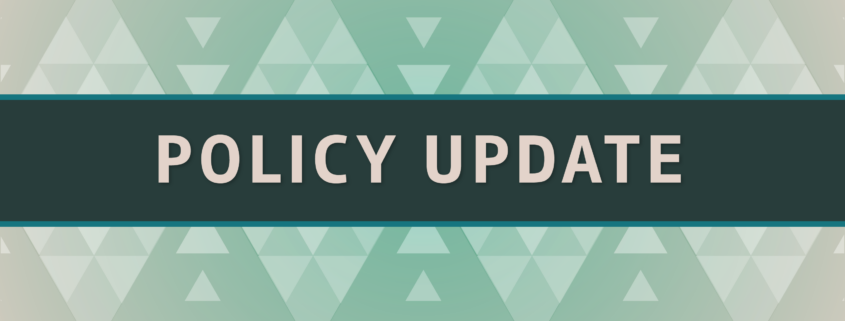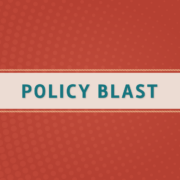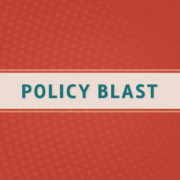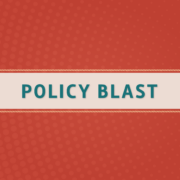Senate Interior Appropriations Bill Passes out of Committee with a 22% Increase for the Indian Health Service and Maintained Advance Appropriations for IHS
The bill includes $8.5 billion for IHS, $1.5 billion more than the amount enacted for Fiscal Year 2024.
On July 25, 2024, the Senate Appropriations Committee completed the markup of the Fiscal Year (FY) 25 Interior, Environment, and Related Agencies bill. The bill passed out of Committee with a vote of 28-1 and will advance to the Senate floor for initial passage. The bill authorizes $8.5 billion for IHS— an increase of $1.5 billion from FY24 and $500 million above the President’s request. The FY25 budget also includes $94.57 million for Urban Indian health, which is $4.17 million above the FY24 enacted levels, but $5.42 million under the House recommended amount and $419,000 under President Biden’s Request. Advance appropriations for IHS was maintained for FY26 and received an increase to $5.45 billion from $5.19 billion for FY25. Other key provisions include: $3 million to improve maternal health and $2.5 million for the Produce Prescription Pilot Program for Tribes and urban Indian organizations (UIOs) to increase access to produce and other traditional foods. A more detailed analysis follows below.
The National Council of Urban Indian Health (NCUIH) recently worked closely with Sen. Smith (D-MN) on leading a Senate Dear Colleague letter signed by 20 Senators to the Senate Interior Appropriations Committee. The letter has bipartisan support and calls for support for Urban Indian Health based on the Tribal Budget Formulation Workgroup (TBFWG) recommendations and to maintain advance appropriations for IHS until such time that authorizers move IHS to mandatory spending.
- FY25 Senate Interior Bill Report with Urban Indian Health Line Item
- FY25 Senate Interior Bill Text
- FY25 Senate Interior Bill Summary
Proposed Amendment Regarding Contract Support Costs and 105 (l) Leases Withdrawn
During the hearing, the Chairman of the Senate Interior Appropriations Committee, Jeff Merkley (D-OR), offered an amendment that would reclassify tribal sovereignty payments as mandatory by FY26, making these payments subject to the appropriations process. Merkley said the payments are required by law and will “affect the Interior budget for a long time to come.” However, Merkley said the proposal did not have enough votes to pass and withdrew the amendment.
NCUIH joined the National Indian Health Board, National Congress of American Indians, and 25 other organizations on a letter urging Congressional Appropriations leaders to transition Contract Support Cost and 105(l) leases to mandatory appropriations, and will continue to advocate for this proposal.
Next Steps
The bill will now advance to the Senate floor for a vote. The legislation is not expected to become law in its current form. House and Senate leadership will work together to negotiate a final bill text for passage in both chambers.
FY24 funding is set to end on September 30, 2024. If Congress cannot come to a funding agreement by that deadline, they will need to pass a Continuing Resolution to keep the funding levels at the FY24 level until they can reach an agreement. Should political disagreements lead to a government shutdown, UIOs and parts of IHS will be protected by Advance Appropriations.
Background and Advocacy
On July 24, 2024, the House of Representatives passed the FY25 Interior Appropriations bill with $8.56 billion for IHS, an increase in FY26 advance appropriations for IHS to $5.97 billion, and $99.99 million for urban Indian health.
- NCUIH Analysis of FY25 House Interior Appropriations Bill
- FY25 House Interior Bill Report with Urban Indian Health Line Item
- FY25 House Interior Bill Summary
Full Funding, Maintain Advance Appropriations, and Mandatory Funding as Priorities
The marked increase for FY25 is a result of Tribal leaders, over several decades, providing budget recommendations to phase in funding increases over 10-12 years to address growing health disparities that have largely been ignored.
In addition to the Senate Dear Colleague letter calling for support for Urban Indian Health based on the TBFWG’s recommendation and to maintain advance appropriations for IHS, NCUIH worked with Representatives Gallego and Grijalva in leading a Congressional letter to the House Committee on Appropriations for FY 2025 with the same requests. On May 8, 2024, Helena Indian Alliance – Leo Pocha Clinic Executive Director Todd Wilson (Crow), testified before and submitted public witness written testimony to the House Appropriations Subcommittee on Interior, Environment, and Related Agencies regarding FY 2025 funding. NCUIH requested full funding for IHS at $53.82 billion and Urban Indian Health for FY 2024 as requested by the TBFWG, maintain advance appropriations for IHS, and support of mandatory funding for IHS.
Bill Highlights
| Line Item | FY24 Enacted | FY25 TBFWG Request | FY25 President’s Budget |
FY25 House Proposed | FY25 Senate Proposed |
| Urban Indian Health | $90,419,000 | $965,419,000 | $94,990,000 | $99,992,000 | $94,573,000 |
| Indian Health Service | $6,961,914,000 | $53,852,801,000 | $8,000,000,000 | $8,561,647,000 | $8,500,000,000 |
| Advance Appropriations | $5,190,00,00 | Request is to expand advance appropriations to include all IHS accounts | $5,129,458,000 | $5,975,150,000 | $5,450,000,000 |
| Produce Prescription Pilot Program | $2,500,000 | ————————– | ———————– | $7,000,000 | $2,500,000 |
| Tribal Epidemiology Centers | $34,433,000 | ————————– | $34,433,000 | $44,433,000 | $44,433,000 |
| Contract Support Costs | $1,052,000,000 | Move to Mandatory | $979,000,000 | $2,036,000,000 | $2,036,000,000 |
| 105 (l) Leases | $149,000,000 | $261,000,000 | $349,000,000 | $400,000,000 | $400,000,000 |
| Alcohol and Substance Abuse | $266,636,000 | $4,859,237,000 | $291,389,000 | $282,380,000 | $273,138,000 |
| Generators at I/T/Us | $3,000,000 | ————————— | ———————– | $8,000,000 | Not in bill report. |
| Maternal Health | $2,000,000 | ————————— | ———————– | $3,000,000 | $3,000,000 |
| Dental Health | $252,561,000 | $3,174,342,000 | $276,085,000 | $283,080,000 | $267,189,000 |
Commitment to Urban Indian Health, UIOs, and Establishment of a UIO Interagency Workgroup
The bill also includes direction for IHS to establish a UIO Interagency Workgroup. The bill report reads, “The Committee is committed to improving the health and well-being of AI/AN living in urban Indian communities. Despite the excellent efforts of Urban Indian Organizations, AI/AN populations continue to be left out of many Federal initiatives. Therefore, the Committee reminds the IHS of the directive to explore the formation of an interagency working group to identify existing Federal funding supporting Urban Indian Organizations [UIOs] and determine where increases are needed, or what programs should be amended to allow for greater access by UIOs; to develop a Federal funding strategy to build out and coordinate the infrastructure necessary to pilot and scale innovative programs that address the needs and aspirations of urban AI/ANs in a holistic manner; develop a wellness centered framework to inform health services; and meet quarterly with UIOs to address other relevant issues. In addition to the Indian Health Service, the working group should consist of the U.S. Department of Health and Human Services, U.S. Department of Housing and Urban Development, U.S. Department of Agriculture, U.S. Department of Justice, U.S. Department of Education, U.S. Department of Veteran Affairs, U.S. Department of Labor, the Small Business Administration, the Economicevelopment Agency, FEMA, the U.S. Conference of Mayors, and others as identified by UIOs.”
NCUIH has advocated for the creation of the UIO Interagency Workgroup as a key step to increasing support and resources to American Indians and Alaska Natives (AI/ANs) living in urban areas. On September 12, 2022, NCUIH submitted comments and recommendations to IHS regarding the formation of an Urban Interagency Workgroup with other federal agencies. The agency held an Urban Confer on July 13, 2022, in response to a letter sent to President Biden and Vice President Harris from several Senators, requesting the formation of such a workgroup. NCUIH will continue to work with House and Senate appropriators to ensure this language is included in the final appropriations bill.
Indian Health Service: $8.5 billion
- Bill Report, Pg. 121: “The Committee recommends $5,211,808,000 in total resources for fiscal year 2025 for Indian Health Services, an increase of $263,077,000 to the enacted level. The Committee recommendation also provides $4,933,790,000 in advance appropriations for the Services account for fiscal year 2026, equal to the fiscal year 2025 Committee recommendation with the exception of funding provided for Electronic Health Records and the Indian Healthcare Improvement Fund, which is provided only an annual appropriation. The following direction relates to the total fiscal year 2025 funding recommendation. All programs, projects, and activities are maintained at fiscal year 2024 enacted levels unless otherwise stated. The bill provides $119,037,000 for pay costs within current services, as requested.”
Urban Indian Health: $94.57 million
- Bill Report, pg. 124: “The recommendation includes $94,573,000 for the Urban Indian Health program, an increase of $4,154,000 to the enacted level.”
Contract Support Costs $2.03 billion and Tribal 105(l) leases $400 million
- Bill Report, pg. 125: “The Committee has continued language from fiscal year 2021 establishing an indefinite appropriation for contract support costs estimated to be $2,036,000,000 in fiscal year 2025. By retaining an indefinite appropriation for this account, additional funds may be provided by the Agency if its budget estimate proves to be lower than necessary to meet the legal obligation to pay the full amount due to Tribes. The Committee believes that fully funding these costs will ensure Tribes have the resources they need to deliver program services efficiently and effectively”
- Bill Report, pg. 126: “The recommendation includes an indefinite appropriation of an estimated $400,000,000 for the compensation of operating costs associated with facilities leased or owned by Tribes and Tribal organizations for carrying out health programs under ISDEAA contracts and compacts as required by 25 U.S.C. 5324(l).”
Dental Health: $267.18 million
- Bill Report pg. 123, “The recommendation includes $267,189,000 for dental health, an increase of $14,628,000 to the enacted level. The Service is encouraged to coordinate with the Bureau of Indian Education [BIE] to integrate preventive dental care at schools within the BIE system.
Equipment: $32 million
- Bill Report, pg. 127: “The recommendation includes $32,598,000 for medical equipment upgrades and replacement, equal to the enacted level.”
Electronic Health Records: $203.88 million
- Bill Report, pg. 123: “The Committee is aware there is a need for a new electronic health record system to improve the overall interoperability, efficiency, and security of the Service’s information technology system and provides $203,880,000 for this effort, equal to the enacted level. Further, the Committee understands many Tribes recently upgraded computer systems for the new Department of Veterans Affairs [VA] system, and it is important these systems are compatible. It is the Committee’s expectation that the Service will be able to use the compiled information gathered during this recent effort with VA to inform both the Service and the Committee on which Tribes use their own system and the estimated costs. Finally, the Committee notes that the Electronic Health Records is excluded from the advance appropriation for fiscal year 2026 as specified in bill language.”
Mental Health: $135.28 million
- Bill Report, pg. 123: “The recommendation includes $135,287,000 for mental health programs, an increase of $5,522,000 to the enacted level. The bill maintains fiscal year 2024 funding for the behavioral health integration initiative to better integrate treatment programs for mental health and substance abuse problems and for the suicide prevention initiative.”
Alcohol and Substance Abuse: $273.18 million
- Bill Report, pg. 123: “The recommendation includes $273,138,000 for alcohol and substance abuse programs, an increase of $6,502,000 to the enacted level. The bill also provides $11,000,000 for opioid abuse.”
Produce Prescription Pilot Program: $2.5 million
- Bill Report, pg. 122: “The bill maintains funding at fiscal year 2024 enacted levels for the Alzheimer’s program and Produce Prescription Pilot program.”
Improving Maternal Health: $3 million
- Bill Report, pg. 122: “The Committee remains concerned with the maternal mortality crisis in the United States, which is even more acute in Native American communities. American Indian and Alaska Native women are two times more likely to die of pregnancy-related causes than White women, and 93 percent of pregnancy-related deaths among American Indian and Alaska Native women are preventable. The Committee recommendation supports funding for maternal health initiatives and provides an additional $1,000,000 for these efforts as noted above. The Committee reminds the IHS of the directive to brief the Committee within 90 days of enactment of this act on its plans for such funds. Further, the Committee directs IHS to coordinate with the Centers for Disease Control and Prevention, Health Resources and Services Administration, and Centers for Medicare and Medicaid Services to further enhance its maternal health initiatives, which should include improved data collection to facilitate an agency-wide effort to improve outcomes for American Indian and Alaska Native women.”
Alzheimer’s Disease: $5.5 million
- Bill Report pg. 122: “The bill maintains funding at fiscal year 2024 enacted levels for the Alzheimer’s program and Produce Prescription Pilot program.”
Purchased and Referred Care: $1 billion
- Bill Report pg. 124: “The recommendation includes $1,005,356,000 for purchased/referred care, an increase of $8,601,000 above the enacted level. The Committee directs IHS to examine the policies for the Purchased/Referred Care Program and work to better facilitate reimbursement of authorized travel to be used for more than one medical procedure or visit during the time that a patient is scheduled for such healthcare treatment.”









